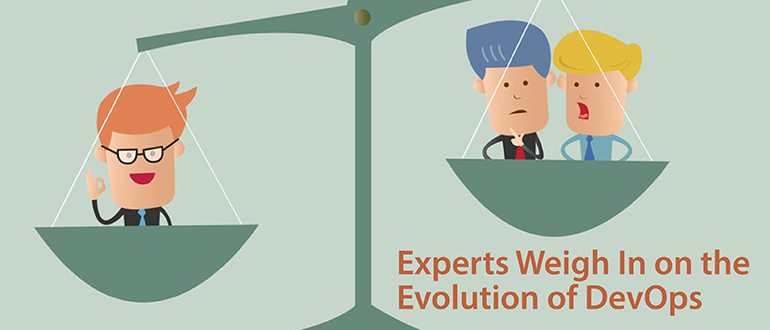What exactly does the future of DevOps look like? As things continue to evolve, and new technologies and practices are introduced, what will DevOps evolve into over the next year, or the next five years? I reached out to some DevOps expert to get some insight on where things are headed.
DevOps is an ethereal concept. It means different things to different organizations and individuals. It also is going through an evolution, which means that as quickly as we might think we have a grasp on what it is and how to effectively employ it, DevOps has moved on. There’s no way to accurately predict whether DevOps will even still be a thing in another five years, or if it will have faded into oblivion—replaced by the next hot tech or development model. We can, however, take a look at how DevOps has changed in the past year, and what the immediate future holds for it.
It isn’t an easy question to answer because first we have to agree on what DevOps is. Are we talking about DevOps as a culture or business model, or are we referring to the evolution of the tools and applications generally used in a DevOps environment? I reached out to the DevOps community to get some expert insight.
Current State of DevOps
“The technology question is a common one when it comes to DevOps. We are still faced with the problem of a clear definition of DevOps. So what makes this difficult is … I’m squarely in the camp that believes DevOps is more about culture than tools or tech,” explains Andrew Storms, vice president of Security Services at New Context. “That being said, a well-rounded and mature DevOps organization does require a shift in people, processes and technology. A lot of people will likely point to orchestration of infrastructure as the most important DevOps tool. However, I think the bigger driver of orchestration has been virtualization and cloud.”
One of the defining characteristics of DevOps from my perspective—aside from the IT culture aspect—is the fact that we continue to raise the bar for automation. Each new automation tool further streamlines the process and puts a spotlight on the next bottleneck. Eventually, a new solution is developed to automate that as well.
Chef CEO Barry Crist believes that one of the most important evolutions in the world of DevOps in the past year is continuous delivery (CD)—or the process of rapidly developing software and iterating through quick, small-batch releases. “Continuous delivery was previously exclusive to the web innovators like Facebook, Amazon and Google, but over the last year companies have realized it’s a primary key to unleash an organization’s innovation engine. When the whole stack—infrastructure, compliance, security, microservices and apps—are all expressed as code, IT is able to deliver value more quickly.”
Read the full article on DevOps.com: Experts Weigh In on the Evolution of DevOps.
- Who Do You Trust Online—And Why? - February 19, 2026
- EC-Council Launches New AI Certifications To Close The Skills Gap - February 10, 2026
- Building Trust into the Cybersecurity Gig Economy - February 5, 2026



